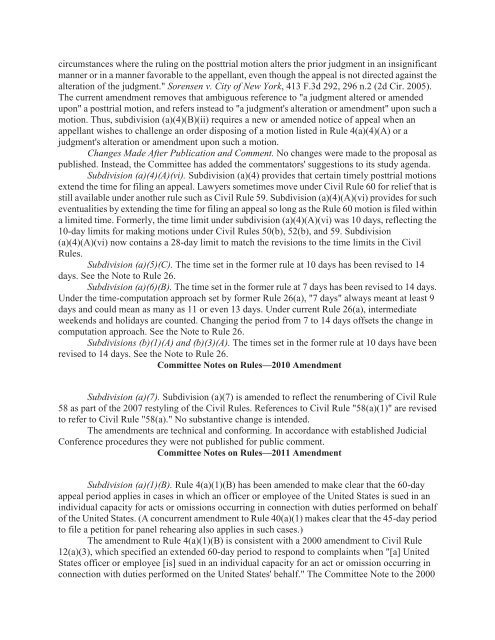Federal Rules of Appellate Procedure 2014-2015, 2014a
Federal Rules of Appellate Procedure 2014-2015, 2014a
Federal Rules of Appellate Procedure 2014-2015, 2014a
You also want an ePaper? Increase the reach of your titles
YUMPU automatically turns print PDFs into web optimized ePapers that Google loves.
circumstances where the ruling on the posttrial motion alters the prior judgment in an insignificant<br />
manner or in a manner favorable to the appellant, even though the appeal is not directed against the<br />
alteration <strong>of</strong> the judgment." Sorensen v. City <strong>of</strong> New York, 413 F.3d 292, 296 n.2 (2d Cir. 2005).<br />
The current amendment removes that ambiguous reference to "a judgment altered or amended<br />
upon" a posttrial motion, and refers instead to "a judgment's alteration or amendment" upon such a<br />
motion. Thus, subdivision (a)(4)(B)(ii) requires a new or amended notice <strong>of</strong> appeal when an<br />
appellant wishes to challenge an order disposing <strong>of</strong> a motion listed in Rule 4(a)(4)(A) or a<br />
judgment's alteration or amendment upon such a motion.<br />
Changes Made After Publication and Comment. No changes were made to the proposal as<br />
published. Instead, the Committee has added the commentators' suggestions to its study agenda.<br />
Subdivision (a)(4)(A)(vi). Subdivision (a)(4) provides that certain timely posttrial motions<br />
extend the time for filing an appeal. Lawyers sometimes move under Civil Rule 60 for relief that is<br />
still available under another rule such as Civil Rule 59. Subdivision (a)(4)(A)(vi) provides for such<br />
eventualities by extending the time for filing an appeal so long as the Rule 60 motion is filed within<br />
a limited time. Formerly, the time limit under subdivision (a)(4)(A)(vi) was 10 days, reflecting the<br />
10-day limits for making motions under Civil <strong>Rules</strong> 50(b), 52(b), and 59. Subdivision<br />
(a)(4)(A)(vi) now contains a 28-day limit to match the revisions to the time limits in the Civil<br />
<strong>Rules</strong>.<br />
Subdivision (a)(5)(C). The time set in the former rule at 10 days has been revised to 14<br />
days. See the Note to Rule 26.<br />
Subdivision (a)(6)(B). The time set in the former rule at 7 days has been revised to 14 days.<br />
Under the time-computation approach set by former Rule 26(a), "7 days" always meant at least 9<br />
days and could mean as many as 11 or even 13 days. Under current Rule 26(a), intermediate<br />
weekends and holidays are counted. Changing the period from 7 to 14 days <strong>of</strong>fsets the change in<br />
computation approach. See the Note to Rule 26.<br />
Subdivisions (b)(1)(A) and (b)(3)(A). The times set in the former rule at 10 days have been<br />
revised to 14 days. See the Note to Rule 26.<br />
Committee Notes on <strong>Rules</strong>—2010 Amendment<br />
Subdivision (a)(7). Subdivision (a)(7) is amended to reflect the renumbering <strong>of</strong> Civil Rule<br />
58 as part <strong>of</strong> the 2007 restyling <strong>of</strong> the Civil <strong>Rules</strong>. References to Civil Rule "58(a)(1)" are revised<br />
to refer to Civil Rule "58(a)." No substantive change is intended.<br />
The amendments are technical and conforming. In accordance with established Judicial<br />
Conference procedures they were not published for public comment.<br />
Committee Notes on <strong>Rules</strong>—2011 Amendment<br />
Subdivision (a)(1)(B). Rule 4(a)(1)(B) has been amended to make clear that the 60-day<br />
appeal period applies in cases in which an <strong>of</strong>ficer or employee <strong>of</strong> the United States is sued in an<br />
individual capacity for acts or omissions occurring in connection with duties performed on behalf<br />
<strong>of</strong> the United States. (A concurrent amendment to Rule 40(a)(1) makes clear that the 45-day period<br />
to file a petition for panel rehearing also applies in such cases.)<br />
The amendment to Rule 4(a)(1)(B) is consistent with a 2000 amendment to Civil Rule<br />
12(a)(3), which specified an extended 60-day period to respond to complaints when "[a] United<br />
States <strong>of</strong>ficer or employee [is] sued in an individual capacity for an act or omission occurring in<br />
connection with duties performed on the United States' behalf." The Committee Note to the 2000


















